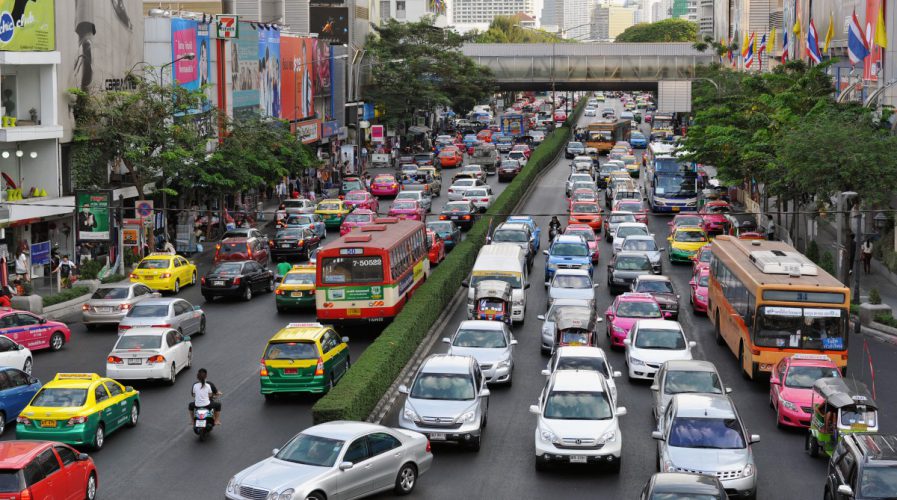
Thailand leads the Southeast Asian EV market with a 60% shareSource: Shutterstock/1000 Words
Thailand leads the Southeast Asian EV market with a 60% share
- The electric vehicle sales in Southeast Asia grew 35% YoY in the third quarter, with the top five brands accounting for almost 67% of the region’s passenger EV sales.
- Thailand registered the highest EV sales volume in the region, capturing almost 60% share, followed by Indonesia and Singapore.
Countries around the world are striving to reach their climate targets, with many turning to electric vehicles (EVs) as a way of reducing carbon emissions. Amidst this revolution, Southeast Asia is emerging as a potential market and manufacturing hub for EVs and within the region, the country with the most rapidly growing EV market is Thailand. Government subsidies have lowered prices for buyers and quadrupled sales this year.
By the third quarter of this year, Thailand had registered the highest EV sales volume in the whole of Southeast Asia, capturing almost 60% share, data by Counterpoint Research shows. For context, according to the country’s Energy Ministry, sales of battery electric vehicles (BEVs) in Thailand rose by a staggering 223% in the first nine months of this year, compared to the same period last year.
Buyers took advantage of generous incentives to register a total of 13,298 BEVs in the year up till September, Energy Minister Supattanapong Punmeechaow said at the end of October. Overall EV sales also grew with 11.9% of the total made up of buses, trucks and other non-car EVs. Counterpoint’s Global Passenger Electric Vehicle Model Sales Tracker shows Thailand leads with the EV sales volume in the region, followed by Indonesia and Singapore.
Overall, passenger EV sales SEA grew 35% YoY in the third quarter of 2022 (3Q22). BEVs constituted 61% of the sales and plug-in hybrid EVs (PHEVs) the rest. Wuling emerged as the best-selling EV brand followed by Volvo and BMW. Overall, the top five brands accounted for almost 67% of the EV sales in SEA.
Counterpoint Research’s analyst Abhilash Gupta shared that “Although the passenger EV sales in SEA are small compared to other regions, the demand is gradually increasing. Currently, EV sales are just a tad over 2% of total passenger vehicle sales in the region,” he said. Gupta also noted that many OEMs are setting up or are planning to set up manufacturing plants across the region “due to favorable policies, subsidies and incentives by major SEA countries like Thailand, Indonesia, Singapore and Malaysia.”
The EV market in Thailand and the rest of SEA region
As Counterpoint puts it, the EV market in Thailand has grown tremendously this year, making it SEA’s undisputed EV leader. As it is, It aims to achieve 100% domestic sales from BEVs by 2035 and at this point, subsidies, excise duty waivers and import tax reductions “have put Thailand on the right path in its EV journey,” the report stated.
On the other hand, Indonesia took 25% share in the SEA passenger EV market sales for 3Q22. In the same quarter, the country registered its highest EV sales volume till date. “The Wuling Air EV model launched during this quarter became an instant hit here and was the best-selling EV model,” Counterpoint stated. What makes Indonesia more interesting is the fact that many companies have recently announced plans for setting up EV battery production units in the country.
That is at large, in line with the country’s target to build 140 GWh of battery capacity by 2030. Singapore, another growing EV market, captured almost 12% share of the SEA EV sales, Counterpoint data shows. Even that city island has a target to achieve 100% zero-emission vehicle sales by 2030 and has introduced various incentives, policies and schemes to increase EV adoption.
To top it off, Singapore is also trying to develop a well-connected network of 60,000 charging points by the end of this decade. Malaysia and Vietnam on the other hand had very somber results compared to their peers. Malaysia only had a 3% share in the SEA EV market in the quarter but because the Malaysian government is supporting the adoption of EVs, further growth can be anticipated.
The country also has exempted EVs from road, import, excise and sales taxes. Vietnam unfortunately announced zero registration fee for EVs in March 2022. Vinfast, the major EV brand, recently discontinued its ICE models to focus on EVs. “The future looks promising for the EV market to flourish in Vietnam,” Counterpoint stated.
READ MORE
- Ethical AI: The renewed importance of safeguarding data and customer privacy in Generative AI applications
- How Japan balances AI-driven opportunities with cybersecurity needs
- Deploying SASE: Benchmarking your approach
- Insurance everywhere all at once: the digital transformation of the APAC insurance industry
- Google parent Alphabet eyes HubSpot: A potential acquisition shaping the future of CRM


